Never Lose Another Prospective Customer
Put Your Business on Autopilot Using
SMS, Email, Web Chat, Phone Calls, and much more!

Never Lose Another Prospective Customer

Put Your Business on Autopilot Using
SMS, Email, Web Chat, Phone Calls, and much more!
Using Answer Every Ring You Can
Speed
Double Your Speed To Lead
Stop missing out on conversations! Streamline all your communication in one place so that you can double your speed to lead and fill your pipeline!
Calendar
Instantly Fill Your Calendar
Say goodbye to missed sales
opportunities! Answer Every Ring schedules appointments for you automatically so that you can close more deals!
Calls
Drive More Phone Calls
Automatically route calls and convert
inbound leads to sales opportunities by connecting you directly with leads who want to talk right now!
Autopilot for your Business through SMS, Email, Web Chat, Phone Calls,
and much more!
SMART
Build SMART Nurture Campaigns
Get up to an 80% response rate from your leads and customers with Answer Every Ring's SMART automation campaigns that interact across multiple channels!
Performance
Gain Key Insights Into Performance
Easily see how well your campaigns and sales team are performing so that you can increase your opportunities and sales!
SMART
Build SMART Nurture Campaigns
Get up to an 80% response rate from your leads and customers with Answer Every Ring's SMART automation campaigns that interact across multiple channels!
Performance
Gain Key Insights Into Performance
Easily see how well your campaigns and sales team are performing so that you can increase your opportunities and sales!
Choose the Package That’s Right for Your Business
STARTER
Perfect for Businesses Ready to Automate Basic Operations
Unlimited Contacts
—no limits on your database
Reputation Management to boost online reviews
Website Chat Widget for instant customer communication
Missed Call Text Back for automated responses
Pipeline Management to track leads and sales
Multi-Channel Messaging (SMS, Email, GMB, Social/Webchat)
3 Team Members to manage responses
$10 Monthly Credits
for ad spend and other tools
24/7 Live Chat Support to assist whenever needed
Account Setup Call for personalized onboarding
GROWTH
For Growing Businesses Looking to Scale with Automation
Standard +
Scheduling Tools
for easy appointment booking
Social Post Planner
to automate social media marketing
Automate Everything with workflows and campaigns
Unlimited Funnels to capture leads and convert sales
Landing Pages That Convert to increase lead generation
Nurture Campaigns for automated follow-ups
Blog features to engage your audience
8 Team Members to scale your business
$20 Monthly Credits for ad spend and other tools
ELITE
Businesses Looking for Full Automation & Features
Professional +
Memberships & Course Builder for online courses and memberships
Community Builder to create an engaged client base
Affiliate Manager to track and grow affiliate marketing
AI-Powered Booking Bot to automate appointment scheduling
AI Voice Assistant for automating phone-based customer interactions
Integrated Ads Manager to run and track ads directly within the platform
Invoicing /Contracts / eSign Builders for streamlined payments
Unlimited Team Members
to expand your business
$50 Monthly Credits for enhanced ad spend
Additional Usage
Text: $0.016 ea.
Local Voicemail: $0.05 ea.
Email: $0.004 ea.
Toll-Free Number: $5 ea
Local Numbers: $3.00 ea.
Toll-Free Minutes: $0.08 ea.
Local Minutes: $0.05 ea.
Toll-Free VM: $0.08 ea.
Industry Leading Features
Automated Follow Up
Automatically message leads across multiple channels including SMS, Email, Voicemail, Calls, Facebook Messenger, and Web Chat to increase response rates to up to 80%.
Team Management
Work as members to see the system how they see it, track progress, set up campaigns, and more.
Communication Center
All of your communications in one place! Email, SMS, Phone, Voicemail, Facebook Messenger, Web Chat and so on!
AI Appointment Booking
Use to book appointments for you so that you can focus on what matters the most: closing deals.
Lead Round Robin
Automatically distribute leads between team members and track the progress on each lead.
Mobile App
Close prospects on-the-go with our mobile app, respond to leads, track statuses, complete reminders, and more.
Live Call Transfer
Automatically get inbound calls every time a lead is ready to talk and when they schedule on your calendar.
Reminders
Remind yourself to call leads, send documents, or any other sales-related tasks in your leads' lifecycle.
Advanced Reporting
Easily see how well your campaigns and sales team are performing so that you can increase your opportunities and sales.
Join 3,200+ Happy Customers!
I love how Anwer Every Ring connects all communication together. It has made it super easy for my team to keep up with new prospects and close more deals!

Christian Kuzdub
Kuzdub Consulting
The campaigns are so simple & easy to create... It's unbelievable.

Joel Karnston
Everton Consulting
I have used different marketing automation platforms, and this is now the best one I can recommend for beginners and SME.

Janiece Nicolette
Komo Consulting
Features That Power Your Business
Features That Power Your Business
Get More Reviews
Turn happy customers into online advocates. Automate review requests, gather more 5-star feedback, and watch your reputation drive new business.
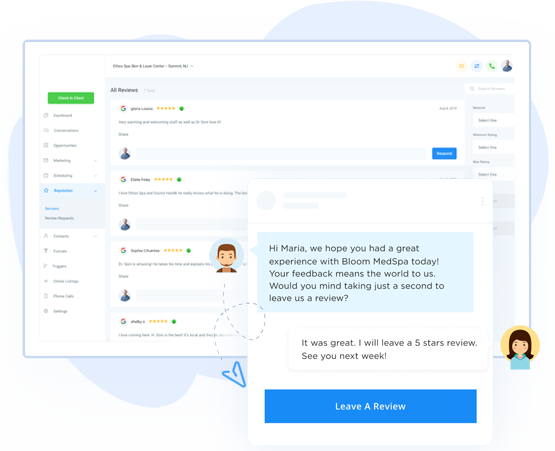
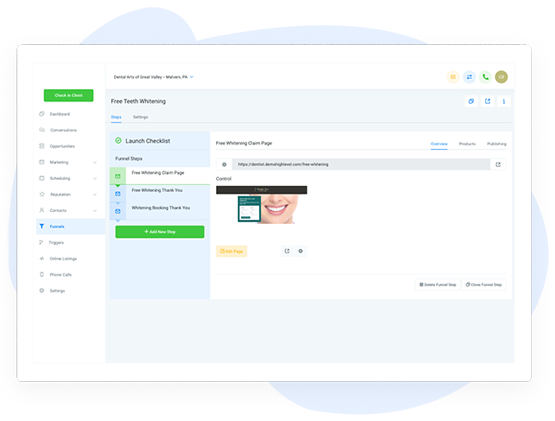
Capture More Leads
Boost engagement from the first ring. Our AI Customer Assistant welcomes callers 24/7, answering FAQs and gathering details so you never lose a potential lead.
Capture More Leads
Boost engagement from the first ring. Our AI Customer Assistant welcomes callers 24/7, answering FAQs and gathering details so you never lose a potential lead.



Never Miss a Call, Text, Facebook Message, or Email Again!
From phone calls to social messages, we unify every channel in one place. Our AI and missed-call text features keep you responsive—no lead goes unanswered.
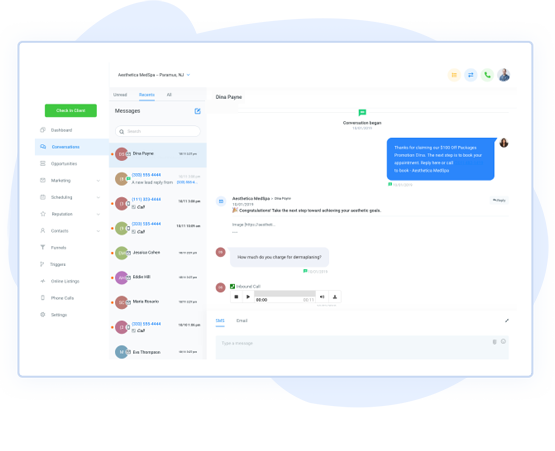
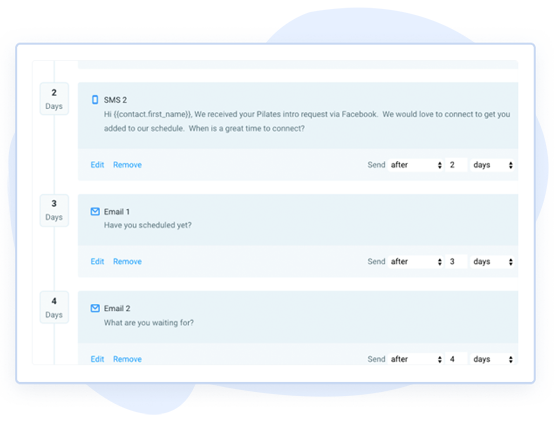
Follow Up Automatically
Never leave interested callers hanging. When staff can’t pick up, our system instantly sends a friendly text, ensuring every missed call becomes a conversation.
Get More Reviews
Turn happy customers into online advocates. Automate review requests, gather more 5-star feedback, and watch your reputation drive new business.

Manage By The Metrics
See every call, text, and conversion at a glance. Our personalized dashboard tracks key performance indicators to refine strategies and fuel growth.
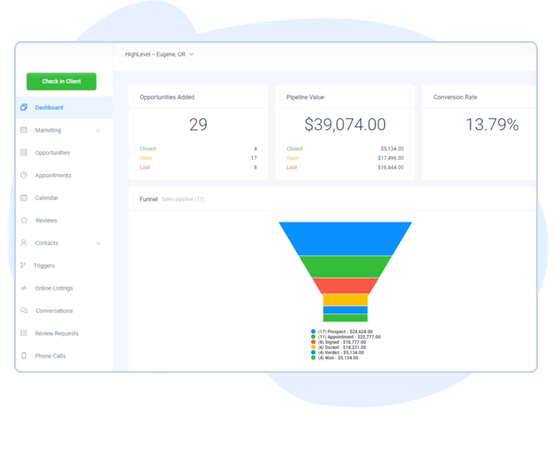
Manage By the Metrics
See every call, text, and conversion at a glance. Our personalized dashboard tracks key performance indicators to refine strategies and fuel growth.


Grow Your Revenue
Move leads from curious to committed with our built-in CRM. Keep track of follow-ups, close more deals, and watch your revenue climb.
Grow Your Revenue
Move leads from curious to committed with our built-in CRM. Keep track of follow-ups, close more deals, and watch your revenue climb.

We play nice with others. :)
You won't need to integrate with much when you use our all-in-one platform...but we're ready to do it when necessary.





We play nice with others. :)
You won't need to integrate with much when you use our all-in-one platform...but we're ready to do it when necessary.





What our customers have to say...
We used to miss dozens of calls when we were out in the field. With Answer Every Ring, every missed call now prompts an immediate text, and clients love the quick follow-up. We’ve turned what used to be lost opportunities into actual appointments—this month alone we booked ten new weekly lawn service clients we might have otherwise lost!
Lauren Pierce, GreenWay Lawn Care
Before adding the AI voice assistant, we’d spend hours returning voicemails from potential customers who’d called overnight. Now, the AI greets them, answers basic service questions, and collects the info we need. By the time we come in, our morning list is full of ready-to-go leads. It feels like we have an extra team member that never sleeps!
Mark Delgado, Delgado Electric
What our customers have to say...
We used to miss dozens of calls when we were out in the field. With Answer Every Ring, every missed call now prompts an immediate text, and clients love the quick follow-up. We’ve turned what used to be lost opportunities into actual appointments—this month alone we booked ten new weekly lawn service clients we might have otherwise lost!
Lauren Pierce, GreenWay Lawn Care
Before adding the AI voice assistant, we’d spend hours returning voicemails from potential customers who’d called overnight. Now, the AI greets them, answers basic service questions, and collects the info we need. By the time we come in, our morning list is full of ready-to-go leads. It feels like we have an extra team member that never sleeps!
Mark Delgado, Delgado Electric
What our customers have to say...
"The most powerful tool at our business. Period!" - Mike Cooch
Best way to get our sales and marketing into high gear without spending a fortune on tools that don't speak to each other.
Seriously amazing support, too.
Real Man
Relative that loves you
I can't believe how much more productive this has made our team. We are growing fast...effortlessly.
Real Woman
Business Owner
I like cat food. And mice. This is a test to see if you are reading this and updating your copy! :)
Real Cat
King of the Jungle
See For Yourself!
Create your free account today.
The Immediate Engagement Journal
No blogs found
The Immediate Engagement Journal
No blogs found
© 2024 Automate the Journey, Inc.
- All Rights Reserved.
